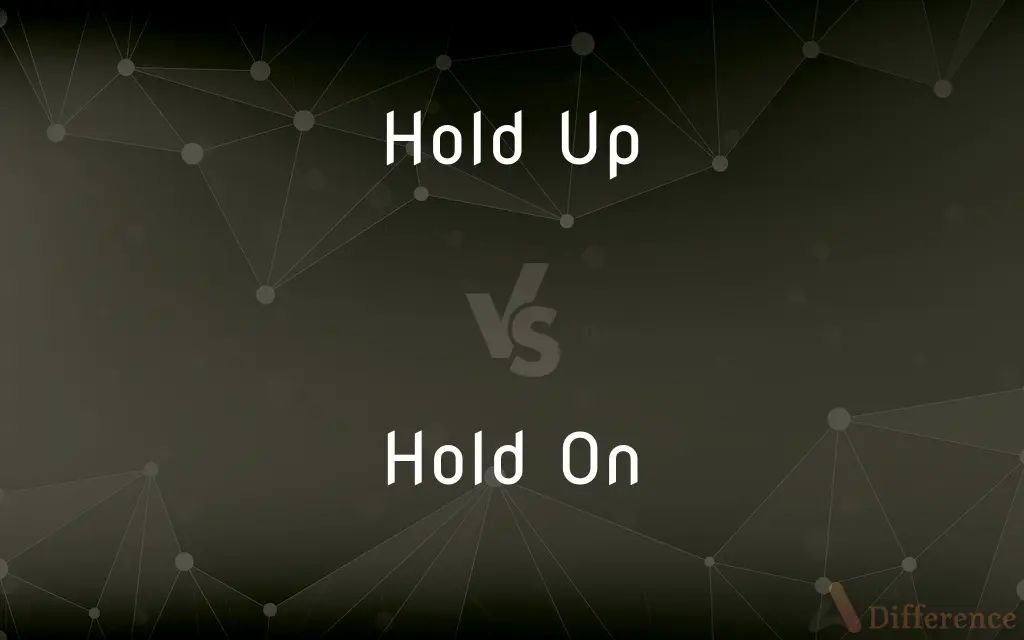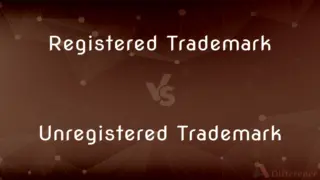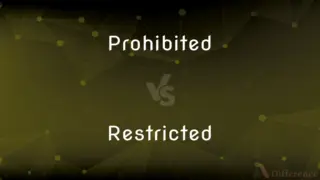Hold Up vs. Hold On — What's the Difference?
By Tayyaba Rehman — Published on November 17, 2023
"Hold Up" means to delay or block, while "Hold On" means to wait or grasp tightly.

Difference Between Hold Up and Hold On
Table of Contents
ADVERTISEMENT
Key Differences
"Hold Up" primarily refers to a delay or obstruction in a process or activity. It's like a roadblock stopping progress momentarily or for an extended period. For example, in construction, if a required piece of machinery breaks down, it could "hold up" the entire project, halting progress until the issue is resolved. On the other hand, "Hold On" is a versatile phrase used to ask someone to wait momentarily or to maintain a grip on something. In conversations, you might hear someone say "Hold on" when they're searching for the right words or need a moment to think.
In another context, "Hold Up" can also imply a robbery, particularly at gunpoint or through other forms of intimidation. This usage is prevalent in American movies and TV shows, where a criminal might enter a bank and shout, "This is a hold-up!" Conversely, "Hold On" doesn't have this criminal connotation. Instead, it can express emotional support. When someone is going through a tough time, you might tell them to "hold on," meaning they should stay strong and keep persevering.
Grammatically, "Hold Up" is a separable phrasal verb, meaning the object can come after the verb and preposition or in between them. For instance, you can say, "Hold up the traffic" or "Hold the traffic up." "Hold On," however, is inseparable—you can't say "Hold your hat on," it should be "Hold on to your hat." This reflects the physicality aspect of "holding on" — maintaining contact or grip, versus "holding up" — obstructing or delaying.
"Hold Up" can also be a noun, denoting a situation that impedes progress—a delay or wait. For example, "We experienced a hold-up on the road due to construction." "Hold On" doesn't take on noun forms; it remains a verb phrase indicating the action of waiting or grasping.
Finally, "Hold Up" in the form of a question can be used to express disbelief or require validation, like asking "really?" or "is that true?". If someone shares surprising news, you might respond, "Hold up! Are you serious?" "Hold On" lacks this interrogative sense. Instead, it's a directive or a request, never a question posed to verify information.
ADVERTISEMENT
Comparison Chart
Basic Meaning
Delay or obstruction.
Wait or maintain a grip.
Grammatical Use
Separable phrasal verb.
Inseparable phrasal verb.
Contextual Use
Can imply robbery.
Expresses support or pause.
Form Variations
Can be a noun or verb.
Used only as a verb phrase.
Expressive Use
Can denote disbelief.
Used as a directive/request.
Compare with Definitions
Hold Up
To delay
The broken-down car is holding up traffic.
Hold On
To pause or interrupt
Hold on, you've got something on your face.
Hold Up
To rob, especially at gunpoint
The masked man held up the bank.
Hold On
To grasp tightly
Hold on to the railing so you don't fall.
Hold Up
To remain valid, true
His alibi didn't hold up in court.
Hold On
To persevere
Hold on, things will get better.
Hold Up
To support or withstand
This table can hold up a lot of weight.
Hold On
To wait
Hold on, I'll be right there.
Hold Up
To stop or pause to discuss
Hold up, let's talk about this.
Hold On
To keep a phone call active
Hold on, I'll transfer your call.
Hold Up
(colloquial) A delay or wait.
What is the hold-up?
Hold Up
A robbery at gunpoint.
This is a hold-up! Give us all your money.
Hold Up
(bridge) The holding back of a card that could win a trick in order to use it later.
Hold Up
(in the plural) Women's stockings designed to be worn without suspenders.
Hold Up
(military) The inventory of nuclear material within a separation plant.
Common Curiosities
Does "Hold Up" have a criminal connotation?
Yes, in some contexts, "Hold Up" can refer to a robbery or crime.
Is "Hold Up" used in informal contexts?
Yes, "Hold Up" can be used informally, especially when expressing disbelief or surprise.
Can "Hold On" be used as a term of comfort or encouragement?
Absolutely, "Hold On" can be used to encourage someone to persevere through difficult times.
Can "Hold Up" and "Hold On" be used interchangeably?
No, "Hold Up" generally refers to a delay or pause, while "Hold On" suggests waiting or maintaining a grip.
Are there grammatical differences between "Hold Up" and "Hold On"?
Yes, "Hold Up" is a separable phrasal verb, while "Hold On" is inseparable.
Is "Hold On" used only in urgent situations?
No, "Hold On" can be used in casual situations to ask someone to wait or pause.
How does "Hold Up" relate to validity or truth?
"Hold Up" can refer to whether an idea or statement remains valid or withstands scrutiny.
Can "Hold Up" function as a noun?
Yes, "Hold Up" can be a noun meaning a delay or obstacle.
Is "Hold Up" formal or informal?
"Hold Up" can be both, depending on context, but is often seen in informal settings.
Does "Hold On" express a need for patience?
Often, yes. It asks someone to wait or be patient.
Can "Hold On" imply physical contact?
Yes, "Hold On" often involves physically gripping something for support.
Does "Hold On" have different meanings in different contexts?
Yes, it can mean to wait, to physically grip something, or to endure patiently.
Can "Hold Up" be an imperative command?
Yes, it can command someone to stop or pause.
Is "Hold On" appropriate in professional environments?
Yes, it's a common phrase to ask for a brief wait or pause in many settings.
In a conversation, what does "Hold Up" signify?
It signifies a request to pause, often because there's a point of contention or disbelief.
Share Your Discovery

Previous Comparison
Registered Trademark vs. Unregistered Trademark
Next Comparison
Prohibited vs. RestrictedAuthor Spotlight
Written by
Tayyaba RehmanTayyaba Rehman is a distinguished writer, currently serving as a primary contributor to askdifference.com. As a researcher in semantics and etymology, Tayyaba's passion for the complexity of languages and their distinctions has found a perfect home on the platform. Tayyaba delves into the intricacies of language, distinguishing between commonly confused words and phrases, thereby providing clarity for readers worldwide.













































